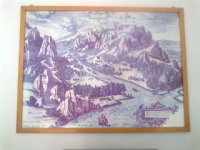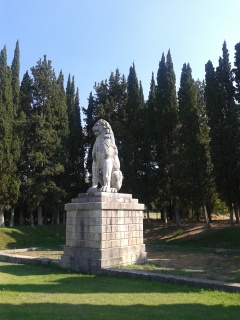Thermopylae

 We left Guesthouse Euridiki very early on St Paraskevi's day. Goodbye to our hostess, and her quiet husband. Goodbye the cool, hushed lobby with the ranked preserves and the craft goods nobody bought; goodbye Elia's Corner. By ten thirty we'd reached Sacred Dion, at the foot of Mount Olympus. One more Macedonian city, but not an architect designed show-off from the World Domination years, like Pella: a city that just grew, the way proper cities ought, around the national shrines. A lovely, unexpected place. The ruins, mostly Graeco-Roman, first century CE, inhabit a shady wetland, hopping with bright green frogs. The deities, Demeter, Zeus, Afrodite, have been replaced (effigies of effigies) just as they were found: small, not gigantic, presiding over the dragonflies. In the museum where the originals are kept we saw portrait statues of ordinary bourgeois, men and women, neither royal nor divine (that's Rome for you), and a beautiful, remarkably well preserved "hydraulis": water-powered harmonium for public entertainments. The silent movie cinema had not survived.
We left Guesthouse Euridiki very early on St Paraskevi's day. Goodbye to our hostess, and her quiet husband. Goodbye the cool, hushed lobby with the ranked preserves and the craft goods nobody bought; goodbye Elia's Corner. By ten thirty we'd reached Sacred Dion, at the foot of Mount Olympus. One more Macedonian city, but not an architect designed show-off from the World Domination years, like Pella: a city that just grew, the way proper cities ought, around the national shrines. A lovely, unexpected place. The ruins, mostly Graeco-Roman, first century CE, inhabit a shady wetland, hopping with bright green frogs. The deities, Demeter, Zeus, Afrodite, have been replaced (effigies of effigies) just as they were found: small, not gigantic, presiding over the dragonflies. In the museum where the originals are kept we saw portrait statues of ordinary bourgeois, men and women, neither royal nor divine (that's Rome for you), and a beautiful, remarkably well preserved "hydraulis": water-powered harmonium for public entertainments. The silent movie cinema had not survived.They'll find a Graeco-Roman tv or a spaceship somewhere around here, one of these days. Or discover it, in a museum drawer, labelled unidentified artefact.
In the car park we reviewed our supplies. The Euridiki boiled eggs were fine, my cheese and honey had been quietly behaving themselves, but Peter's jam had escaped and been scampering about. So we dealt with that, admired the wall tile reproduction of sixteenth century holiday crowds, dancing and swimming and boating in the Vale of Tembe & then back to the road. But we had left the Egnatia, and re-entered the real world. It was hot, the traffic was drastic, the signage outrageously unreliable. No More Mr Nice Motorway! Legendary Tempe, the leaf-fringed gorge where the river Rhinios cuts a pass, celebrated for millenia by poets and scholars, that Keats dreamed of; where Ovid's Daphne lived happily ever after, having escaped from rape by turning into a shrub, was hellish. St Paraskevi, who has a magic roadside spring here, wasn't helping, but I feel that until more of the romantic crags have been razed, and the roadworks completed, this bottleneck is best avoided. Take the long way round.
30th July. At the first petrol station on the road out of Volos we stopped for a decent kafe elleniki, served by a friendly, competent mother and small boy team, and then onward, hugging the coast for safety, down to the Maliakos Gulf. Still hugging the "coast", but with silted up and reclaimed farmland on our left, we found the Thermo part of the legend without any difficulty, soon after skirting Lamia. The "Gates" (Pylae) are no more, of course. This is no longer a narrow strip of land between the cliffs and the sea. The hot springs, where the Spartans of the rearguard (according to legend), bathed and oiled themselves, preparing their bodies for death, were right there by the road, just as The Rough Guide describes. There's a fence, but the gate was open. A medicinal spa building stands near by, but it seemed, on our visit, empty and half-derelict. It was very quiet. Peter declined, he didn't want to smell of sulphur. I stripped off, I was wearing my bikini under my clothes on purpose. I'm afraid I disturbed the three or four Greek bathers (didn't look like tourists, maybe locals, bathing for their health), but I couldn't help it. The rocks in the spring were green with algae, the water hot and bubbly and definitely sulphurous, paradoxically refreshing in the midday heat.
Here I am, I thought. Finally: in the place that has meant so much to me, for forty years or more. Go and tell the Spartans, someone.
Why so much personal meaning? It's a great story, and quite possibly the third day sacrifice of the rearguard here, actually did change the course of that particulat war: allowing the Athenians a little more time to evacuate; giving Themistocles a breathing space and a second chance at that vital naval victory. But how can I know that the good guys even won, at Salamis, after all this time? The Spartans, for instance, were absolute b*****ds when they were at home. Fascist is a polite word for the way they carried on... And the Athenians were no better than they should be. The word Thermopylae means something different to me. It has evolved. It means a poem by Cavafy, that I met when I was an undergraduate, a expatriate Greek's austere, modernist concept of heroism. The sober business of recognising a just cause and sticking to it, even if you know you can't possibly win. Even if you know (as many do forsee, as Cavafy says) that might is sure to triumph in the end.
Honor to those who in their life
Set out and guard Thermopylae.
Never wavering from duty;
just and forthright in all their actions,
though yet with mercy and compassion;
generous when rich, and when
poor, still in small measure generous,
helping again, as they can;
always speaking forth the truth,
yet without malice for the deceitful.
A higher honour indeed is due
when they foresee (as many do)
that Ephialtes will in the end appear,
and the Medes will eventually break through.
C.P.Cavafy trs Evangelos Sachperolou
The next stage was exhausting. We made a mistake, when trying to leave Thermopylae, made another mistake when trying to undo the first, and had to climb all the way up the mountains (the views over the Gulf were stupendous), on a single track road with no turning places. Worse still, when we reached the village of Karia, high up in the sky in the middle of nowhere and dead to the world, there was no way down the other side except via alarming-looking, unsurfaced, dirt tracks. So we turned and drove all the way back to the Thermopylae junction, & saw what we ought to have done at once (its often the way). The roads were good and played no tricks from then on, from Thermopylae to Regini, via Modi and Kato Tithorea. Cheronia (ancient Chaeronea) took us by surprise. It was roasting hot. We bought ice creams from a supermarket man who unpadlocked his freezer for us, and told us the antiquities were just on down the road. We ate our ices, with cold lemonade from a kiosk (best ice I've ever tasted) outside an aestivating cafe, and drove on. Here, in 338 BCE, a hundred and forty years or so after Thermopylae, the dream of the city states, that the Spartans died for, died itself, under the onslaught of Philip of Macedon's ambition (with a little help from his son). What we had come to see was hard to miss: a 6 metre tall white marble lion, raised by Alexander himself, they say, to honour the Theban Band, that army of lovers, who died here "to a man". He probably slaughtered some of them himself, personally, but I'm sure they'd still have appreciated the gesture. Blokes are like that.
 Reports differ, maybe some of the lovers survived; maybe the Thebans paid for the lion, and Philip and Alexander just graciously allowed them to honour their dead. But still, lost for centuries, dug up by Ali Pasha (he couldn't get it transported to Ioannina), admired by Byron in its fallen glory, the white lion has been restored, patched together and replaced on its pedestal. It stands in the middle of a green lawn where the Theban Band are buried, surrounded by cypress trees. It's a very nice lion. We liked it a lot. "This is the end of the Philip of Macedon trail," I told Peter. "The end of what he did to Greece, anyway." And we stayed there for a while. Nobody else came by.
Reports differ, maybe some of the lovers survived; maybe the Thebans paid for the lion, and Philip and Alexander just graciously allowed them to honour their dead. But still, lost for centuries, dug up by Ali Pasha (he couldn't get it transported to Ioannina), admired by Byron in its fallen glory, the white lion has been restored, patched together and replaced on its pedestal. It stands in the middle of a green lawn where the Theban Band are buried, surrounded by cypress trees. It's a very nice lion. We liked it a lot. "This is the end of the Philip of Macedon trail," I told Peter. "The end of what he did to Greece, anyway." And we stayed there for a while. Nobody else came by.*The philosopher Apollonios Tyanefs (1st century CE) was once asked, which is the highest mountain in the world, and he replied: "Kolonos is the highest mountain in the world, because on this mountain law keeping and noble self-sacrifice have put up a monument, which has its base on the earth and reaches the stars".
**I didn't look too closely at the wreaths. I feared they were fresh, and sentiments expressed on those blue and white ribbons might be a little to the right of Nationalist. If you know what I mean.
